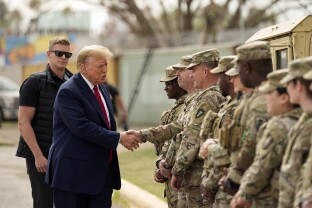Donald Trump’s openness to using the military domestically has officials and legal experts scrambling to figure out how far he can push the law.
Trump has said he’s willing to use the National Guard as law enforcement against dissidents — what he called the “enemy from within” — and to bring about mass deportations. Pentagon officials are reportedly discussing what they’ll do if Trump makes an unlawful order and whether Trump’s impulses will drain the Department of Defense of experienced officials. One defense official told CNN they were “planning for the worst-case scenario.”
Legal experts told NOTUS that there are several untested pathways to use active duty military domestically — including ones that would not require Congress’ approval.
Richard Painter, the White House ethics lawyer under George W. Bush, is closely watching to see if Trump invokes the Insurrection Act. This “open-ended” law would allow the president to use the military domestically and against Americans.“We need to have that conversation — without the sort of campaign rhetoric comparing Trump to any foreign dictators — we need to keep in mind that this is a danger,” Painter said. “I mean, we could have a situation where someone’s wearing a Kamala Harris T-shirt on Jan. 21, is denying the legitimate presidency of Donald Trump and has engaged in insurrection.”
Senior defense officials told CNN they are nervous about the implications of Trump acting on some of his most extreme rhetoric. Likewise, they expect an expansion of some of the use of the National Guard that’s currently in place — like assisting Customs and Border Protection at the border — though Trump could extend that into U.S. cities to carry out deportations.
Professor Geoffrey Corn, the director of the Center for Military Law and Policy at Texas Tech University, outlined several hypotheticals where the Insurrection Act gives Trump a direct line to use military troops.“So you could imagine that Gov. [Greg] Abbott says, ‘I need help under the Insurrection Act,’ and boom, the president can issue the pro forma proclamation to disperse and then order the use of the military to support,” Corn said.
Corn was also worried about the possibility of a Republican-led Congress getting engaged to create the same results.
“The much simpler way to do it, and the one that would really even make it harder to challenge it legally, would be to get Congress to authorize it,” he said.
He pointed to the war on drugs under the Reagan administration as a road map for Trump. At the time, military training, equipment and intelligence assets were all on offer to the Bureau of Alcohol, Tobacco and Firearms.Republicans look like they’ll have a small majority in the House and would need Democratic support to overcome the Senate’s filibuster to enact that kind of legislation. There is a precedent, though, with Congress passing the Anti-Drug Abuse Act of 1986. That type of action steps outside the Posse Comitatus Act.
The Posse Comitatus Act specifically prohibits using the active duty military for law enforcement. That is unless it’s authorized by a law passed by Congress or in direct support of the Constitution, which the Insurrection Act already covers.
These exemptions give a president broad discretion. The New York Times reported that Trump considered invoking the Insurrection Act against George Floyd protesters in 2020.
Trump’s fraught relationship with the Department of Defense and military leaders — paired with his escalated rhetoric during his third presidential campaign — is informing the anxiety.
Retired General and former Trump White House Chief of Staff John Kelly told The New York Times recently that he thought Trump fit the definition of a fascist, and he told The Atlantic that Trump wanted “the kind of generals that Hitler had.”
In 2020, many current and former senior leaders pointed out the same concern.
“A number of retired generals and admirals have spoken out with alarm over the last week about adding active-duty military to law enforcement, and using the Insurrection Act to do so,” Admiral James Stavridis wrote at the time. Stavridis is the former four-star naval officer who served as a supreme allied commander at NATO.
“We cannot afford to have a future Lafayette Square end up looking like Tiananmen Square,” he wrote separately.Trump has “declared war on the cartels” in Mexico and said that he’ll deport “millions” of people from the U.S. Chris Miller, at one point the acting secretary of Defense under Trump in 2020, told podcaster and former SEAL Shawn Ryan that he’d recommended to Trump that Special Forces assets deploy against “a threat to the South.”
“Because we’ve done this before,” Miller told Ryan. “Isn’t this a Special Operations mission?”
While it would take an act of Congress to authorize support, it wouldn’t be the first time the active duty military has engaged along the border and in Central America. Miller alluded to Delta Force operators searching for Pablo Escobar during the war on drugs.
The Anti-Drug Abuse Act of 1986 was supported, in part, by the Department of Defense. Most of the support was in the form of information and equipment sharing, but as Miller mentioned, it didn’t rule out direct action by active duty military.
Trump might use the military along the southern border in a similar way as long as he has Congress’ support.
Regardless of a president’s aims, these policy levers would allow him to use the military, with its 1.3 million active service members, to be ordered to engage in issues here at home.
—
John T. Seward is a NOTUS reporter and an Allbritton Journalism Institute fellow.
Sign in
Log into your free account with your email. Don’t have one?
Check your email for a one-time code.
We sent a 4-digit code to . Enter the pin to confirm your account.
New code will be available in 1:00
Let’s try this again.
We encountered an error with the passcode sent to . Please reenter your email.


